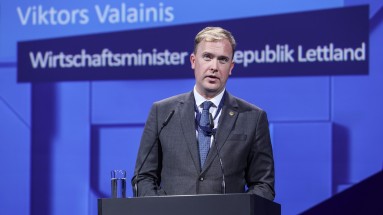Page content
Latvia on its Way to Becoming a Smart Nation

Latvia has only been a member of the European Union and NATO for 20 years, introduced the euro just 10 years ago, and joined the OECD in 2016. On the international stage, it is a relatively young nation, but when it comes to digitalization, the Baltic state is considered a pioneer. Ninety-one percent of public administration services are digitalized, as Minister of Economics Viktors Valainis emphasized in his keynote at the Smart Country Convention. The public sector is thus making its services "as convenient as possible" for citizens. However, the country does not intend to stop there: "Latvia’s vision is to become a digitally strong state, developing into a Smart Nation."
"Our goal is for every citizen and every company to benefit from a digital transformation that is sustainable and continually evolving," Valainis continued. Such a system should bring together a highly efficient digital state, local authorities with digitally educated citizens, and a globally operating digital economy. The foundation of this development is Latvia's IT sector, which currently comprises around 10,000 companies and generates over five billion euros in revenue. These companies are providing the necessary innovations for Latvia's sustainable digital economy.
Cooperation for the Digitalization of the European Union
Latvia boasts one of the best communication infrastructures in the world. Ninety-two percent of households are connected to the internet, while the EU average is currently only 73 percent, Valainis explained. Europe's first military 5G test field has also been launched in Latvia, where military applications can be researched and tested—something particularly important in the current political climate.
A cooperative approach is central to Latvia’s digital vision, which extends far beyond public administration services. The government is building data platforms from which both the public and private sectors can benefit. These platforms are designed to be open and secure to enable practical applications and foster interoperability within the EU. Valainis highlighted that Latvia's collaboration with Germany, Lithuania, and Estonia in the Digital Innovation Club is a key example of this: "The Club is a shining example of how EU states can work together for the digital future of a strong Europe."
Become an exhibitor at #SCCON25
As a driving force for the future of digital administration and for equal digital living and working conditions in cities and rural areas, the Smart Country Convention is a must for all stakeholders who actively advance the digital transformation. Are you interested in advancing the digitization of our cities and municipalities too? Join us and position your company or municipality as an expert in digitalization in the public sector.



